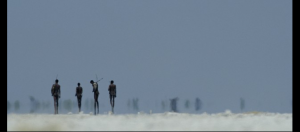The Namibian | 22 Jan 2010
BRIGITTE WEIDLICH
A foreign company intends to clear 10 000 hectares of land in the Bwabwata National Park in northern Namibia in order to set up a large-scale irrigation scheme for crop farming, which will require 75 million cubic metres of water a year from the Okavango River, equalling the total water consumption of Namibia’s population for a year.
According to an information leaflet issued this week, the company, Demeter International through its subsidiary LIH Demeter Agribusiness (LDA) intends to develop a 10 000-hectare agricultural project in the park.
Its local joint-venture partners are Labour Investment Holdings (LIH) and the Hambukushu Traditional Authority. The land is to be leased from that tribal authority.
The Katondo Farming Project (KFP) intends to employ a minimum of 150 local people. KFP will also assist the local community to grow labour- intensive vegetable and other crops that can be sold locally, the company promises.
“LDA is currently in the process of procuring the right of leasehold on the land,” the leaflet said.
The project is supposed to provide a sustainable, commercial source of staple food production to ensure maximum food security for Namibia.
At first 2 500 hectares a year will be cleared and irrigation installed, providing full production in year six. Apart from selling the produce locally, surplus will be exported to neighbouring countries.
Winter crops like wheat and canola seed will need irrigation, based on ten centre pivots of 65 hectares each fed from a plastic-lined canal.
It will be fed by high-capacity pumps lifting water out of the Okavango River. About 75 million cubic metres of water a year will be required for the total 10 000 hectares.
The summer crops of rice, maize, sunflowers and soybeans will be predominantly rain fed.
The area to be used for the large-scale crop farming is close to Divundu in the recently declared Bwabwata National Park. The people who live there are predominantly of the Mbukushu and the Kwe or Barakwena community, who are of San origin.
A local company started an environmental scoping process to identify initial issues of concern. The first public hearing was held in Windhoek on Monday, but it had not been advertised.
Concerns raised were that the area lies in the proposed Kavango-Zambezi (KAZA) Transfrontier Conservation Area, which is a project of member states of the Southern African Development Community (Sadc), including Angola, Namibia, Zambia, Zimbabwe and Botswana in order to attract tourism.
Since the Okavango River is a shared watercourse, water abstraction at such huge volumes must be agreed on by all countries sharing the river.
Wildlife and tourism experts also fear human–wildlife conflict, as the loss of 10 000 hectares to agriculture would mean loss of habitat for wildlife and thus reduced tourism. There might also be problems with traditional land tenure arrangements and conflict between the Hambukushu and Kwe communities, according to the leaflet.
“The sustainability and feasibility of the project as a whole might be questionable,” an environmental expert, who did not want his name mentioned, told The Namibian yesterday.
Friedrich Alpers of the Integrated Rural Development and Nature Conservation (IRDNC) organisation said the Kyaramacan Trust, which represents the interests of the Mbukushu and Kwe people living in the Bwabwata National Park, was left out of the project. “They are not part of the joint venture of this Demeter company. The park is about to receive an international organic certification for the harvesting of Devil’s Claw, which is used for medicinal purposes,” Alpers told The Namibian.
“This certificate will increase the prices the local harvesters there will receive for collecting Devil’s Claw, but if this agricultural project materialises, then I don’t know what will happen to the certificate,” Alpers added.
The Working Group of Indigenous Minorities in Southern Africa (Wimsa), which represents San people, was surprised about the apparent progress of the envisaged project.
“The Kwe have for many years trying to secure their land rights [with Government] in that area. It is surprising that a 10 000-hectare irrigation project would enjoy such quick progress,” Ben Digby-Clarke of Wimsa told The Namibian yesterday.
“There are also important gravesites of Kwe ancestors in the area, that might be an issue,” Digby-Clarke said.
According to its official website, Demeter International was founded in 2004 to provide professional farm management in Russia and more recently in southern Africa.
Demeter is focused on staple food production to reduce the import levels in the various countries where they operate. Demeter has “significant experience of ‘marrying’ international investors with politicians and local partners to enhance rural prosperity and food security,” the company website says.
The site does not reveal the ownership of the company, which has its headquarters in the British Virgin Islands, but said it had “wide-scale experience of land acquisition in Africa, Eastern Europe, Russia and the UK, producing returns in the agricultural sector well above industry norms”.
In order to do that it required highly fertile soils, adequate rainfall, sustainable water supplies, and secure land tenure to be able to apply economies of scale resulting in low cost staple food production.
“Demeter operates large-scale farming units using a majority of investors’ equity rather than debt and invests in under-performing or green field agri businesses through leases, joint ventures and service management contracts. We focus on potential high-yielding sites throughout Russia and Africa,” the company states on its website.













